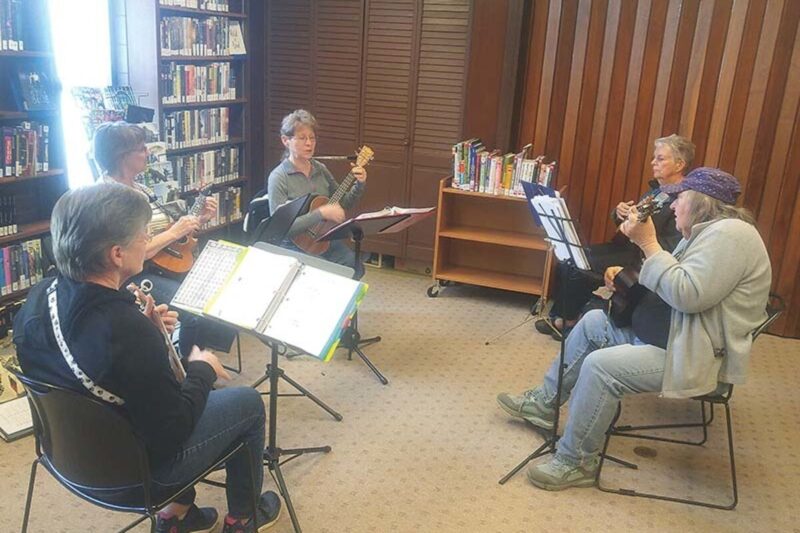Sean C. Morgan
The Sweet Home City Council last week approved a nearly $50,000 contract to complete a needs assessment and conceptual drawings for the Sweet Home Public Library to help address growth in usage.
The library moved from 1,200 square feet of the City Hall basement to its present location, with 5,825 square feet, at the intersection of 13th and Kalmia streets, in 1969.
“Since 1969, the demand for library service, (including) circulation, programs, meeting space and public computer use, has grown steadily, outpacing the library’s ability to provide services from a physical standpoint,” said Library Director Rose Peda. The existing building’s capacity is no longer adequate. There is a need to transform the library’s interior and exterior.”
The city issued a request for proposals, Peda said. The lone response came from FFA Architecture and Interiors, with Penny Hummel acting as a subcontractor. The city followed up with other consultants, who told the city they had busy schedules that would not allow them to meet the city’s timeline.
FFA Architecture and Interiors proposed a needs assessment, community forums and drawings for $49,875.
Hummel, of St. Paul, Minn.-based Library Strategies consulting firm, is a former president of the Oregon Library Association, a former director of Canby Public Library and marketing and communications director for the Multnomah County Library, where she also served as president of the Friends of the Multnomah County Library.
Peda said the nonprofit Friends of the Library are paying $5,000 of the cost, and she anticipates securing a $5,000 grant from the Ford Family Foundation to assist.
In the request for proposals, Peda outlined what the city is looking for, including a dedicated children’s play area, a young adult area, study rooms and remodeling to reflect modern electrical needs and modern energy efficiency, a face lift for the front exterior, removal of the stairs in favor of a ramp and a remodel of the foyer.
An expansion of the building may be required to include the rear parking lot of the building and the alley between the library and Post Office, the RFP said.
The library has 80 to 100 children attending its weekly Summer Reading Program, Peda told The New Era. “We had been doing those on the streets. The building itself cannot handle 80 to 100 children with their parents.”
No space in the library can handle 100 people, she said. “We want to do programs for children in the afternoons. Our children’s area is just not capable of handling it.”
The children’s area is packed during programs, she said, and congestion is a problem.
The electrical system was installed in 1969, Peda noted.
“At that time, people didn’t have personal devices they would bring in and use with wifi and need to plug in. We’ve adapted methods for people to use their devices here in the library.”
That infringes on the Teen Room.
“Right now the Teen Room is the major area where we have people plug in, and we would really like to offer teen programming,” she said.
“We have things going on here all the time,” Peda said.
Last Thursday afternoon, five adults were gathered in the Teen Room practicing the ukulele while two others were working at laptops on tables in the same room. In the main library, multiple public computers were in use.
The library, open 36 hours a week, is always busy, Peda said. “At a quarter to 6, we may be slow. We have people who come in here daily just to sit and read the newspaper and use the wifi.”
For a lot of them, it’s about human contact, Peda said. “We physically see them.”
Peda would like to take back the Teen Room for teens, she said, and she wants comfortable seating for patrons who stop at the library to read newspapers.
“What we really want to focus on first is the building, making the building so it meets the community’s needs for the next 20 years,” she said. “It’s still a good building.”
The consultant will look at the flow at the checkout counter, Peda said.
According to the RFP, the staff spaces are fragmented and awkward, and they need to be reconfigured for flexibility and efficiency.
“They’ll look at the collection as a whole and decide how it should be housed,” Peda said. The consultant will look at the arrangement and size of different areas, and the consultant will gather input from members of the public about what they would like from their library.
“We have basically been making do with this building for a very long time,” she said. “We’ve just been adapting to the situation.”
For an example, she pointed to an ethernet cable stretching across the floor with a cable cover to the computers at the checkout counter.
Next up, the consultant will visit the library and community to evaluate the building and conduct staff focus groups followed by community meetings and community focus groups.
Voting to approve the contract during the City Council’s regular meeting April 23 were Cortney Nash, Lisa Gourley, Mayor Greg Mahler, Diane Gerson, James Goble and Dave Trask. Susan Coleman was absent.





